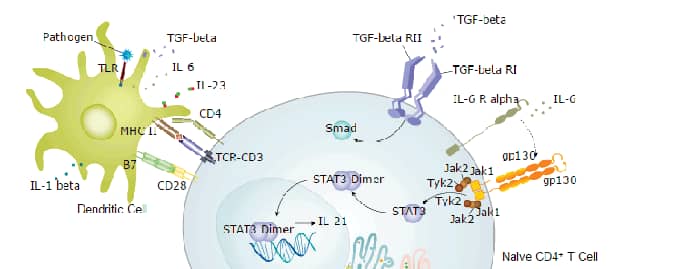Rat B7-2/CD86 Antibody Summary
Met1-Ile250
Accession # NP_064466
Applications
Please Note: Optimal dilutions should be determined by each laboratory for each application. General Protocols are available in the Technical Information section on our website.
Scientific Data
 View Larger
View Larger
IL‑2 Secretion Induced by B7‑2/CD86 and Neutralization by Rat B7‑2/CD86 Antibody. Recombinant Rat B7-2/CD86 Fc Chimera (Catalog # 1340-B2) co-stimulates IL-2 secretion in the Jurkat human acute T cell leukemia cell line in the presence of PHA in a dose-dependent manner (orange line), as measured by the Human IL-2 Quantikine ELISA Kit (Catalog # D2050). IL-2 secretion elicited by Recombinant Rat B7-2/CD86 Fc Chimera (1 µg/mL) and PHA (10 µg/mL) is neutralized (green line) by increasing concentrations of Mouse Anti-Rat B7-2/CD86 Monoclonal Antibody (Catalog # MAB13401). The ND50 is typically 0.3-1.0 µg/mL.
Reconstitution Calculator
Preparation and Storage
- 12 months from date of receipt, -20 to -70 °C as supplied.
- 1 month, 2 to 8 °C under sterile conditions after reconstitution.
- 6 months, -20 to -70 °C under sterile conditions after reconstitution.
Background: B7-2/CD86
For optimal T cell expansion and activation, a signal induced by the engagement of the T cell receptor and a “co-stimulatory” signal(s) through distinct T cell surface molecules are required. Members of the B7 superfamily of counter-receptors were identified by their ability to interact with co-stimulatory molecules found on the surface of T cells. Members of the B7 superfamily are type I membrane proteins and include B7-1 (CD80), B7-2 (CD86), B7-H1 (PD-L1), B7-H2 (B7RP-1), B7-H3, and PD-L2 (1). B7-2 is expressed constitutively at low levels on most Antigen Presenting Cells (APC) and is rapidly upregulated upon cell activation (2). T cells express two different receptors (CD28 and CTLA-4) capable of binding both B7-1 and B7-2 (2). B7-2 binds to CD28 with the low affinity but binds to CTLA-4 with intermediate affinity. In contrast, B7-1 binds CD28 with intermediate affinity and CTLA-4 with high affinity. Additionally, these molecules have different kinetics for binding CD28 and CTLA-4 with B7-2 having a higher-binding dissociation kinetics (1). Engagement of CD28 by B7-2 increases T cell proliferation and IL-2, IL-4, and IFN-gamma production, thereby enhancing the immune response (3). In contrast, engagement of CTLA-4 is involved in the down-regulation of the immune response (4). Rat B7-2 cDNA encodes a 313 amino acid (aa) precursor protein containing a an extracellular domain, a transmembrane domain, and a cytoplasmic domain. Rat and human B7-1 share 54% aa identity.
- Coyle, A.J. and J-C. Gutierrez-Ramos (2001) Nature Immunol. 2:203.
- Sharpe, A.H. and G.J. Freeman (2002) Nature Reviews 2:116.
- Freeman, G.J. et al. (1995) Immunity 5:523.
- Walunas, T.L. et al. (1994) Immunity 1:405.
Product Datasheets
FAQs
No product specific FAQs exist for this product, however you may
View all Antibody FAQsReviews for Rat B7-2/CD86 Antibody
There are currently no reviews for this product. Be the first to review Rat B7-2/CD86 Antibody and earn rewards!
Have you used Rat B7-2/CD86 Antibody?
Submit a review and receive an Amazon gift card.
$25/€18/£15/$25CAN/¥75 Yuan/¥2500 Yen for a review with an image
$10/€7/£6/$10 CAD/¥70 Yuan/¥1110 Yen for a review without an image





